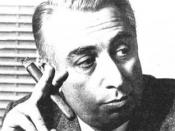In 1968, the French social and literary critic, Roland Barthes, pronounced the death of the Author. What does this so called death mean? Furthermore, what is the author that Barthes claims is now dead?
Barthes develops his assertion by describing writing as the 'destruction of every voice, of every point of origin. Writing is ... the negative where all identity is lost, starting with the very identity of the body writing' (121). Barthes assertion of the death of the author refers not to the empirical or literal death of a given author therefore, but to the fact that, in a radical sense, the author is absent from the text.
Barthes argues that the voice of the author becomes unimportant once the act of narrating has taken place. The thing narrated comes to function in the symbolic world. The notion of the author is a modern invention, and is discovered in the 'prestige of the individual' (Barthes 121).
As such, the modern author functions as an ideological figure. Barthes, in part, is arguing against the common ascription of authority to the figure of the author.
Barthes refers to some of the implications of twentieth-century linguistics as regards the question of the author and his or her authority. He quotes the French nineteenth century symbolist poet, Mallarme, in saying that 'language speaks, not the author' (121), that is to say, he considers the idea that the language is in control of the author, rather than conceive of the author being in control of the language that he or she uses. In this respect, language can be thought of as a kind of system within which any writer must take a designated place: the system and rules of language inevitably dictate the possibilities of what someone can say. 'Linguistically', he argues,


